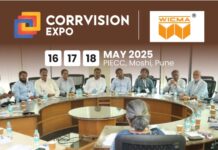Bengaluru, January 16, 2016: Two days National Seminar on Pure, Safe and Nutritious milk was organized jointly by Indian Dairy Association (Gujarat State Chapter) and SMC college of Dairy Science during 11-12 December 2015 at AAU, Anand. The program was attended by more than 500 delegates from dairy industry and academic institutions from all over India. There were 15 presentations from subject experts and dairy industry stalwarts, who deliberated intensely on the issues of milk, its safety concerns through hygienic production and handling, problem of adulteration and nutritional attributes. The body strongly reacted against anti-milk campaign by some agencies and advising the policy makers against import of dairy products to protect the milk producers of the country.
At the inaugural function, Dr. J. B. Prajapati, Vice President (IDA,Guj) and Principal SMC College of Dairy Science in his welcome address, briefed on activities of IDA and SMC College of Dairy Science jointly since 1998, when the first State Chapter of Indian Dairy Association was opened-up by the holy hands of Dr Kurien on 27th January 1998 at Dairy Science College, Anand. He reminded that we all are concerned with the issues related to pure and nutritious milk and this seminar could come up with recommendations of concern to the policy makers. Dr. K. Rathnam, Managing Director, Amul Dairy, Anand, threw some light on the theme of safe and nutritious milk and what industry can do to ensure it. Dr. H.G. Koshia, Commissioner, Food & Drugs Control Admin. Government of Gujarat, Guest of Honour in his speech highlighted the steps that are taken by FSSAI for ensuring the quality and safety of milk that reaches the customers. Hecongratulated the Dairy Science College for producing skilled technocrats. He also made the audience regurgitate the enforcement of e-governance, to make the work of citizens’ smooth and incorporate transparency in the process.
Shri R. S. Sodhi, Managing Director, GCMMF Ltd, the Chief Guest of the function began his keynote address by reminding the audience that milk was once a rationing commodity and was a privilege thing. He paid homage to Dr. V. Kurien, Father of ‘White Revolution’ whose effort made milk available to common man and remarked that India is the largest producer as well as consumer of milk in the world. He also addressed various reasons for volatility of price of milk and milk products in the international market. He foresighted that average daily intake of milk will rise to 850 g/day on an average, by 2050 which will require a production of 540 MMT, which possess the challenge to increase the domestic milk production. He also cautioned that some international agencies project that India will be deficit in milk in coming years and permit imports. If government does this, it will be extremely harmful to our farmers. Rather government should take effective steps to promote local milk production. He further added that even each milk producer add one more animal, it will take care of required milk production in coming years!. He also remarked that innovations have revolutionised the Dairy Industry from production, procurement, processing and marketing finally ensuring the quality. He also said that in the world, Indian Dairy industry has a very unique and efficient distribution pattern for milk, owing to which we are able to pay better prices to the farmers. He further addressed various challenges faced by Dairy Industry like adulteration and the need for an effective method to check adulteration at the collection areas. He emphasized that the shift of consumer preference from locally sold loose milk to branded packaged milk could increase the demand for branded milk and a check for adulteration in a better way. He finally concluded that if we have to safeguard the Indian Dairy Industry, we need to protect the good will of its entire stake holders.
Dr. N. C. Patel, Hon. Vice Chancellor, AAU, Anand, in his Presidential address recalled the contribution of Dr. Kurien and Tribhuvandas Patel to the ‘AMUL’ model. He portrayed Cow and Buffalo as biological machines and gave a vision to in-vitro synthesis of milk as a future of Dairy Industry. He also realised the gravity of today’s scenario, and the need to develop small scale sophisticated machinery in rural areas to ensure quality and safety for the betterment of farmers and the society at a large. He stressed on the need of value addition as an inseparable step to meet the burgeoning customer needs and the incorporation of milk as nutraceuticals. Shri. H. K. Gupta, Hon Secretary IDA (Guj) delivered the vote of thanks.
Faculty consisted of Dr K Rathnam, MD, Amul Dairy, Anand, Shri A K Dhagat, Sr GM, AmulFed Dairy, Gandhinagar, Dr TSR Murali, Chief R&D Officer, Mother Dairy Fruit & Veg. P. Ltd. Delhi, Dr. (Prof.) K.D. Aparnathi, SMC College of Dairy Science, Anand, Dr. J.V. Parekh, Consultant, Mumbai, Mr. Sameer Saxena, Sr Manager, GCMMF Ltd, Anand, Dr. Dinesh G Shah, Indi Foss Analytical P Ltd, Ahmedabad, Mr. Parvinder Singh, GEA Process Engineering (I) Pvt. Ltd, Vadodara, Dr. (Prof.) P.C. Vasavada, University of Wisconsin, USA, Shri Aditya Jain, Sr Mgr., NDDB Anand, Dr (Prof.) Atanu Jana, SMC College of Dairy Science, Anand, Dr. Anindita Mehta, CERC, Ahmedabad, Dr. Bency Kathayat, Amul Dairy, Anand, Mr. Mohd Abdul Kalam Azad, Milk Vita, Bangladesh and many other experts. The program had a cultural eve, specially executed by the students of SMC College of Dairy Science and special attraction was ‘Manthan’, a play of ‘Amul India Story’ in its raw form, which received a huge applaud from the audience. At the plenary session on 12th Dec, Dr. J. B. Prajapati reiterated that it is the social responsibility and moral duty of all the participants and organization connected to dairy to ensure safety, nutrition and purity of milk and milk products for the consumers
1. India is the largest producer as well as consumer of milk and is capable of producing enough milk in future too. Government and dairy industry should provide full support to milk producers to increase milk production and discourage import of dairy products.
2. Consumer awareness about branded, packed milk should be increased by all the agencies connected to dairying to reduce the risk of safety and control adulteration.
3. Amul Pattern Cooperatives have played a monumental role in transforming the lives of millions of milk producers of India and hence government policy should be encouraging to cooperatives in the interest of the farmers.
4. Fortification of milk or bio-enrichment, if necessary should be done with natural ingredients or developing recipes with plant materials that are nutritionally complementary to milk. Fortification with chemicals for vitamins or minerals should be discouraged. Enough natural affordable sources of vitamins A, C, Folic Acid and Iron are available in India. The Indian population may be educated through the media sponsored by National Health Mission as was done for Iodine deficiency or Pulse Polio.
5. Processing of milk is important before consumption and high level of hygiene is a prerequisite for marketing of raw milk. Permitting drinking of raw milk is dangerous from human health point of view.
6. Large number of qualitative tests are reported in the literature for detection of a particular adulterant in milk. Hence, the test giving the best results should be adopted for application. Research has shown that temperature of milk, duration of heating and presence of multiple adulterants affects performance of qualitative tests. Hence, utmost care is needed to select the test for detection of adulterants.
7. There is a need to develop small scale machinery to pasteurize and pack the milk at farm level to enhance safety and shelf-life of milk.
8. Academic institutions and dairy industry should react for social awareness to the anti-milk campaign by some agencies and bring out the multiple benefits of milk.
Corporate Comm India(CCI Newswire)





























